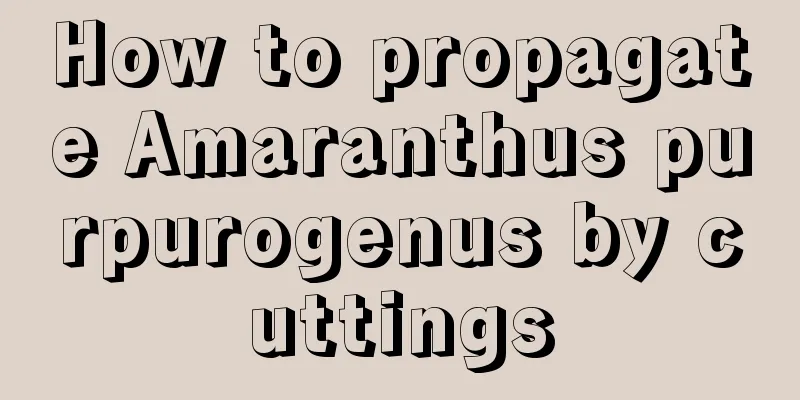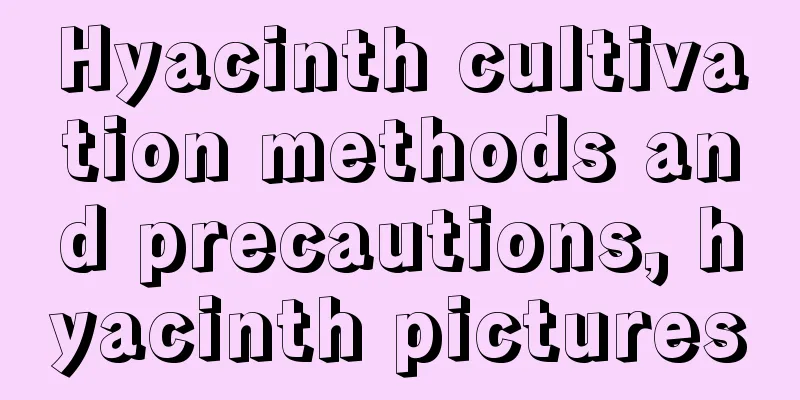What are the cultivation methods and precautions of plum blossoms?

Plum Blossom IntroductionPlum blossom is a small tree, 4-10 meters high, with light gray or green bark, green twigs, ovate or elliptical leaves with serrated edges, gray-green color, strong fragrance, calyx usually reddish brown, some varieties are green or green-purple, petals are white to pink, and the fruit is nearly spherical. Plum blossom is generally grown by grafting, cuttings, sowing, and layering. Plum blossom cultivation methodPlum blossoms have strong adaptability, like warm environments, are heat-resistant, and are suitable for planting in soils with deep soil layers, low groundwater levels, good drainage conditions, loose topsoil, and slightly clayey subsoil. Plum blossoms are suitable for planting in soil with good drainage. You can mix rotten leaves, sandy soil and compost. When watering, check whether the soil is dry or not. If it is dry, you can water it thoroughly. It is suitable to grow in plenty of sunlight. If the maintenance environment does not have enough light, the growth will not be good. It is best to keep it between 16-23℃. Watering methodThe watering of plum blossoms needs to be based on the dryness and wetness of the soil. If the soil is dry, water it thoroughly. Control the amount of watering to maintain basic moisture. Excessive moisture in the potting soil is not conducive to the growth of the plant. Fertilization methodPlum blossoms are fertilizer-loving plants and need appropriate fertilization during the growth period. Generally, a thin liquid fertilizer is sufficient. Fertilizer is applied once every half a month during the growing season. Before flowering, phosphorus and potassium fertilizers can be added to achieve the purpose of promoting and preserving flowers. Remember not to apply concentrated fertilizers and raw fertilizers. Pruning methodsCultivating plum blossoms also requires proper pruning, mainly cutting off branches that are growing poorly, growing too long, being diseased, or being too dense. Pruning the remaining flowers after they have faded can reduce nutrient loss, ensure sufficient nutrients, and promote plant growth. Disinfection is required after pruning to avoid infection of the incision. Precautions for plum blossom cultivation1. To grow plum blossoms well, you need to provide suitable soil. It is best to use well-drained, loose and fertile soil for growing plum blossoms. When preparing the soil, you must ensure that there is sufficient base fertilizer. In addition, if you want to maintain the potted plants, you need to change the potting soil every 1-2 years to provide more sufficient nutrients for the plants. 2. During the cultivation of plum blossoms, sufficient light needs to be provided. It is suitable for maintenance in a sunny and ventilated place. It is recommended to place it on a balcony or windowsill, which is beneficial to its growth and flowering. However, shade is needed in summer to avoid strong light from damaging the plant. In addition, the branches and dead flowers can be trimmed 20 days after flowering to reduce the loss of nutrients. |
<<: What are the cultivation methods and precautions for four-season azalea
>>: What are the cultivation methods and precautions for hydroponic Anthurium
Recommend
Do the roots of Dendrobium seedlings need to be disinfected when they are potted? When will they bloom?
1. Is disinfection necessary? The roots of Dendro...
Is wolfberry a shade-loving or sun-loving plant?
Does wolfberry prefer shade or sun? Wolfberry is ...
How often should you water chives?
How often should you water chives? Generally, lee...
What to do if the leaves of the lucky tree are dry
1. Increase lighting Reason: The lucky tree loves...
What should I do if the succulent leaves suddenly fall off?
1. Treatment methods Generally, if all the leaves...
What fertilizer is best for pear trees in autumn?
The temperature and ground temperature are relati...
Difference Between Ginkgo and Apricot
1. Different tree crowns Ginkgo tree is a species...
How to plant black orchid seeds
Selecting the matrix There has always been a trad...
Can lucky bamboo be made from orange peel water?
1. Can it be used? You can use orange peel water ...
How to plant wintersweet seeds
The seeds of wintersweet flowers usually mature i...
How often is it best to water the money tree?
The money tree is a perennial evergreen small tre...
What is the best month to plant strawberries?
When are strawberries planted? Strawberries are g...
How to deal with Oncidium after flowering and how to prune it
1. How to deal with Oncidium after it blooms 1. P...
Cultivation methods and precautions of Lanyu cinnamon
Lanyu cinnamon is very easy to grow. To grow it, ...
How long is the growing period of autumn cabbage?
How long is the growing period of autumn cabbage?...









